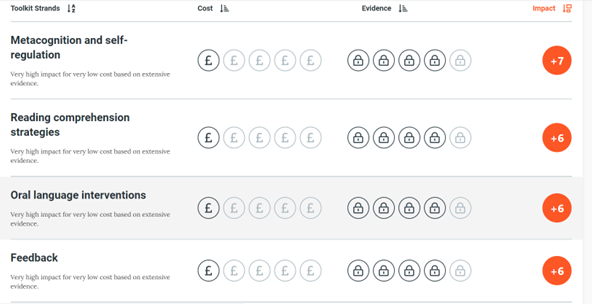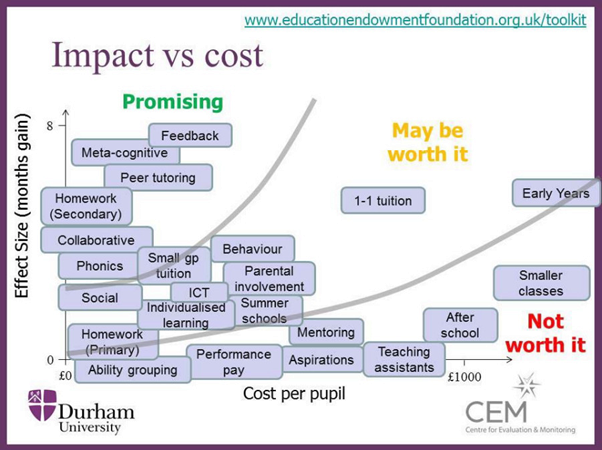April Blog 2023
During this holiday, the Senior Leadership Team are reading a book called ‘Reaching the unseen children’ by Jean Gross. It looks at practical strategies for closing the stubborn disadvantaged attainment gap, with particular focus on underachieving boys (and we can all think of students like this in our classroom!). Gross references research heavily, and in particular, the EEF teaching and learning toolkit. I want to draw your attention to some of the strategies that are highlighted and what we should be doing in our classroom to implement these effectively.
The following screenshots of this research, which I am sure many of you have seen before, highlight the importance of intervention. The Toolkit looks at each of the key interventions that schools use, how much they would generally cost (£) and then the strength of the research behind this (Padlock). The number in the circle at the end is the months of progress an average child will make compared to a child who does not receive that intervention. The link below will allow you to go onto the website and have a more detailed look if you would like.


https://educationendowmentfoundation.org.uk/education-evidence/teaching-learning-toolkit
Let’s take a look at some of the strategies mentioned at the top of the league for promoting progress and what we should be doing in the Crookhorn classrooms.
Feedback: "Feedback is information given about the learner’s performance relative to learning goals. It should aim towards (and be capable of producing) improvement in students’ learning. Feedback redirects or refocuses the learner’s actions to achieve a goal, by aligning effort and activity with an outcome. It can be about the learning activity itself, about the process of activity, about the student’s management of their learning or self-regulation or (the least effective) about them as individuals. This feedback can be verbal, written, or can be given through tests or via digital technology. It can come from a teacher or someone taking a teaching role, or from peers."
Crookhorn: We promote many different ways of providing feedback, including through exercise books and ItsLearning. I believe that live feedback is best; the student is in the process of learning and any corrections or adjustments to their learning at that point should have most effect. We also have done some training with our TAs, and if you are working with a TA and have given them support with this, they could also help with live marking. Many teachers are now using ItsLearning to provide feedback, with audio and video feedback being used to help with teacher workload. If you need any support with this, please see your coach.
Homework: "Homework refers to tasks given to pupils by their teachers to be completed outside of usual lessons. Common homework activities may be reading or preparing for work to be done in class, or practising and completing tasks or activities already taught or started in lessons, but it may include more extended activities to develop inquiry skills or more directed and focused work such as revision for exams."
Crookhorn: We believe that homework should be set consistently across the 5-year groups. If students are not consistently set homework for your classes in KS3, they will not be in good habits as they move into KS4. Homework should be planned into your components of learning and should be set through ItsLearning. The use of SENECA or ItsLearning self-marking tests should be used, to make sure teacher workload is not increased. Prepare students for upcoming assessments in KS3 by getting them to study for this using the revision techniques we promote, as again, this will promote good habits for them when it comes to GCSEs.
Reading: "Reading comprehension approaches to improving reading focus on learners’ understanding of the text. They teach a range of techniques that enable pupils to comprehend the meaning of what is written, such as inferring the meaning from context, summarising or identifying key points, using graphic or semantic organisers, developing questioning strategies, and monitoring their own comprehension and identifying difficulties themselves (see also Meta-cognition and self-regulation)."
Crookhorn: We all have a responsibility to improve the reading comprehension of the students in our class. It can’t be seen solely as the task of an English teacher, or Cheryl, Sarah Woods or Ellie McBride with their specific interventions and mentoring. We are moving DEAR time from after Roll Call over to the morning which will be linked in with tutor time to increase the profile of reading and its importance with students and staff. Teachers should think about their planning and consider where there are opportunities to enable students to read, the potential barriers they may face and then develop student understanding of what has been written. We have asked HOS to choose words from out Tier 2 vocabulary lists that teachers will be promoting, to develop further students’ understanding of key words, to support them with their reading.
Collaborative learning and oracy: "Collaborative or cooperative learning can be defined as learning tasks or activities where students work together in a group small enough for everyone to participate on a collective task that has been clearly assigned. This can be either a joint task where group members do different aspects of the task but contribute to a common overall outcome, or a shared task where group members work together throughout the activity. Some collaborative learning approaches also get mixed ability teams or groups to work in competition with each other, in order to drive more effective collaboration.”
Crookhorn: By getting students to work together, and talk to each other about their learning, we will see progress made. As a College, we have followed the research and introduced mixed attaining teaching in many of our classrooms (see below), and the classroom layout you have in your classrooms should facilitate students to be able to easily discuss learning. Plan for this, and don’t forget the ground rules we have in place to make sure that the students discuss learning in the right way. We want to develop skills that students will need for the rest of their lives, not just to pass their GCSEs! Working together in a team, presenting ideas, looking at two or more points of view and realising that others have a different take to you are all strategies we want our children to have.

We have an amazing group of teachers at Crookhorn, and our students are very lucky to have such a hard-working, determined, and self-reflective collective of staff to support them. When you have your next coaching session, please use this blog to reflect on where you stand with each of the strands I have highlighted, and what you could do to improve your practice in the coming months. Have a great summer term, and if you have any questions or reflections on this blog, please do not hesitate to ask.

